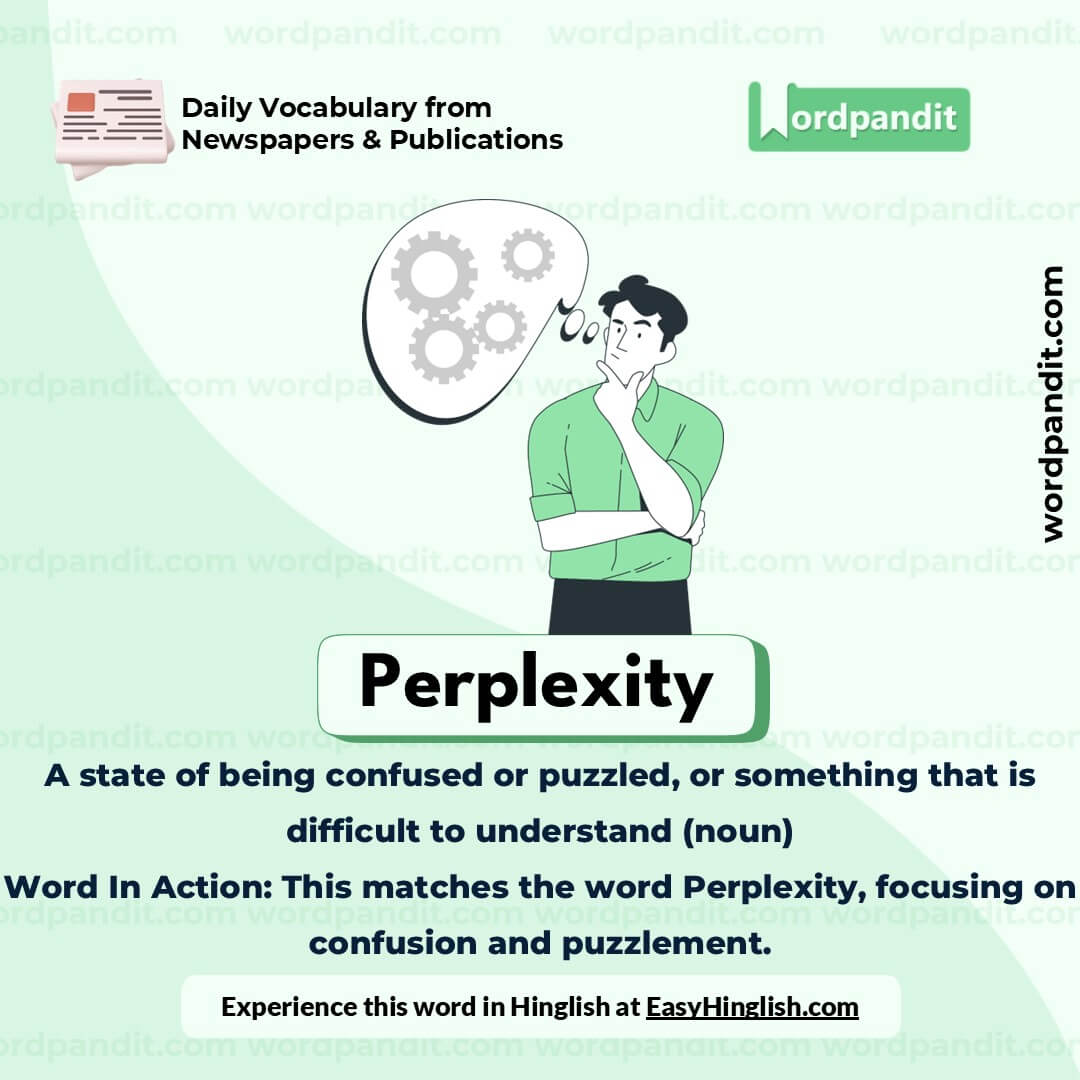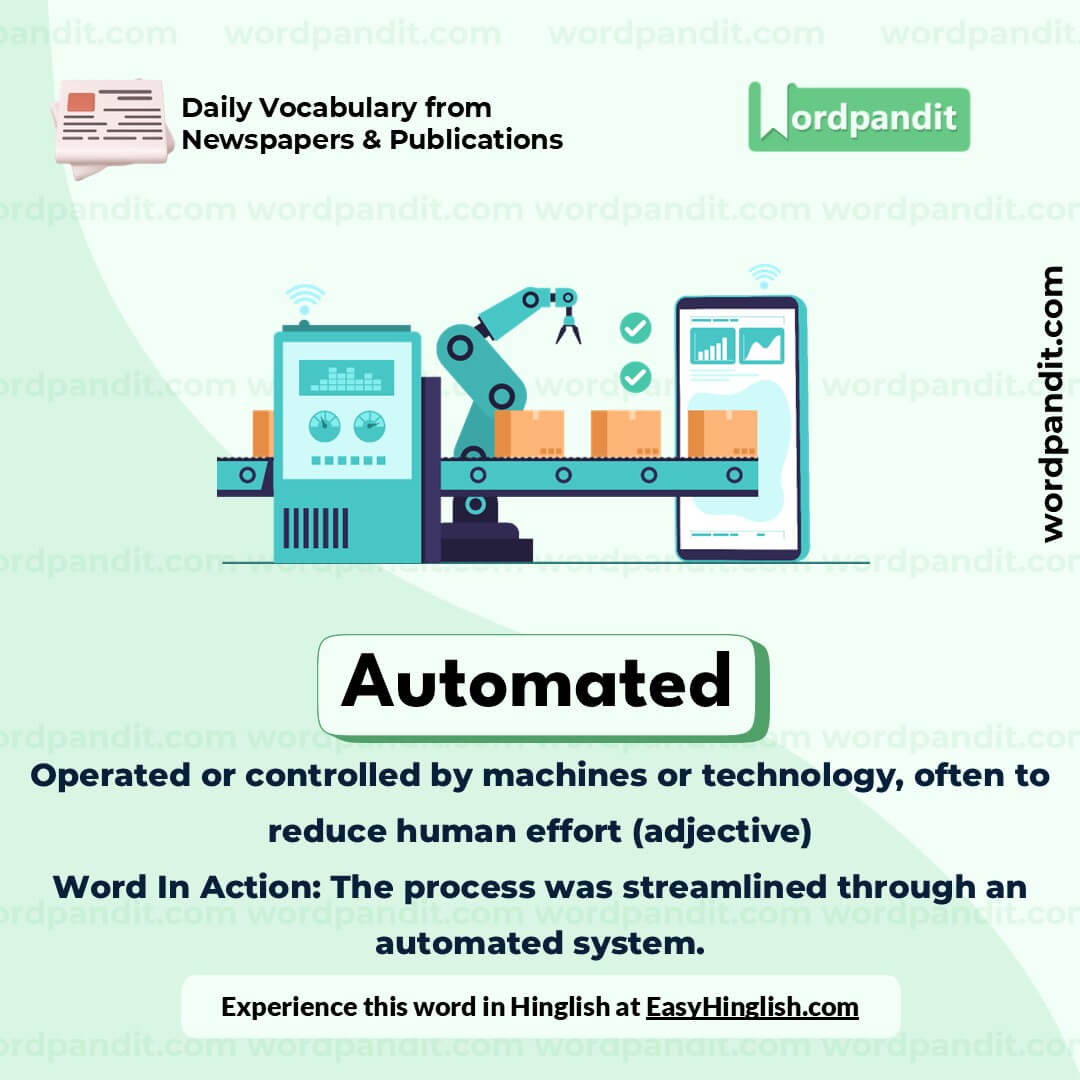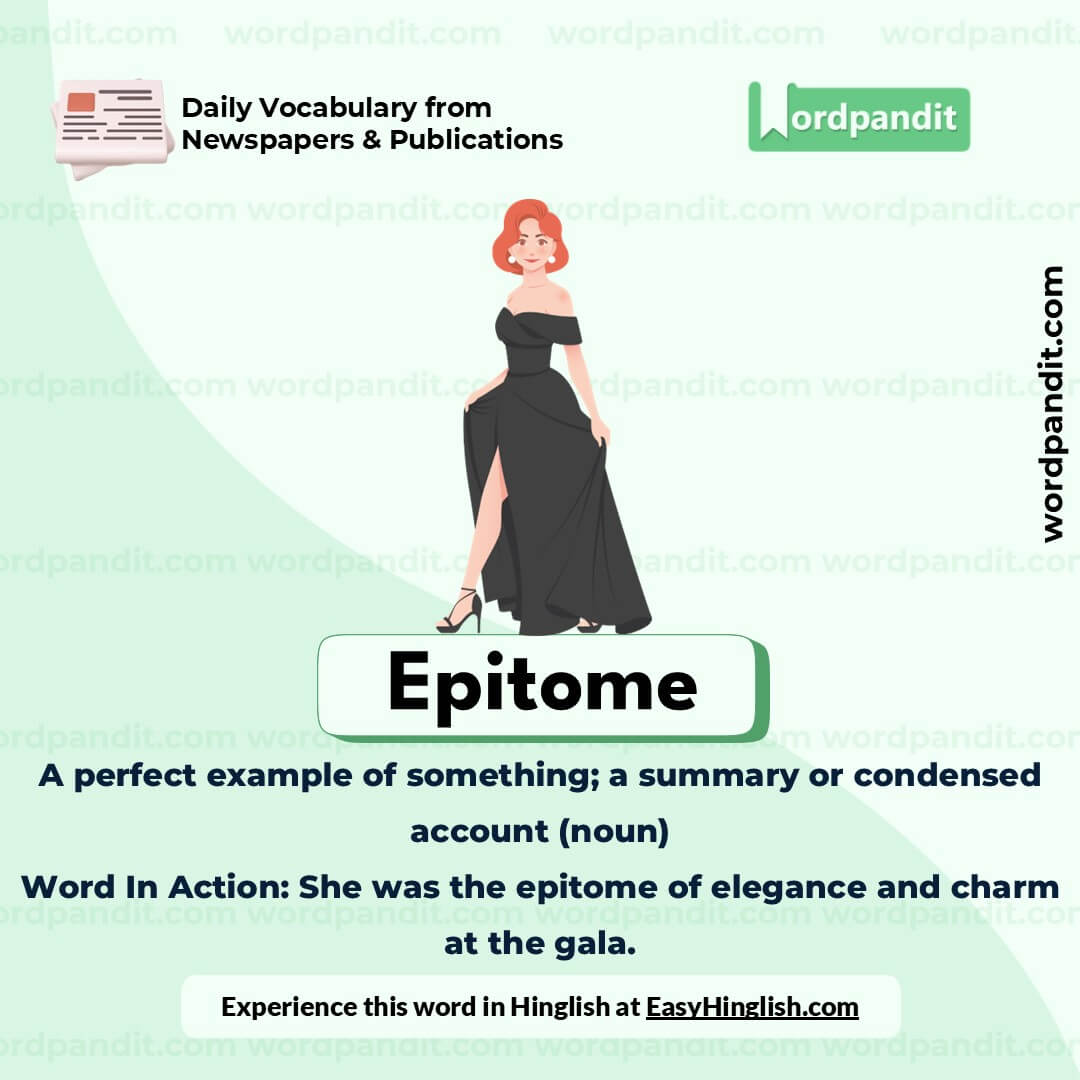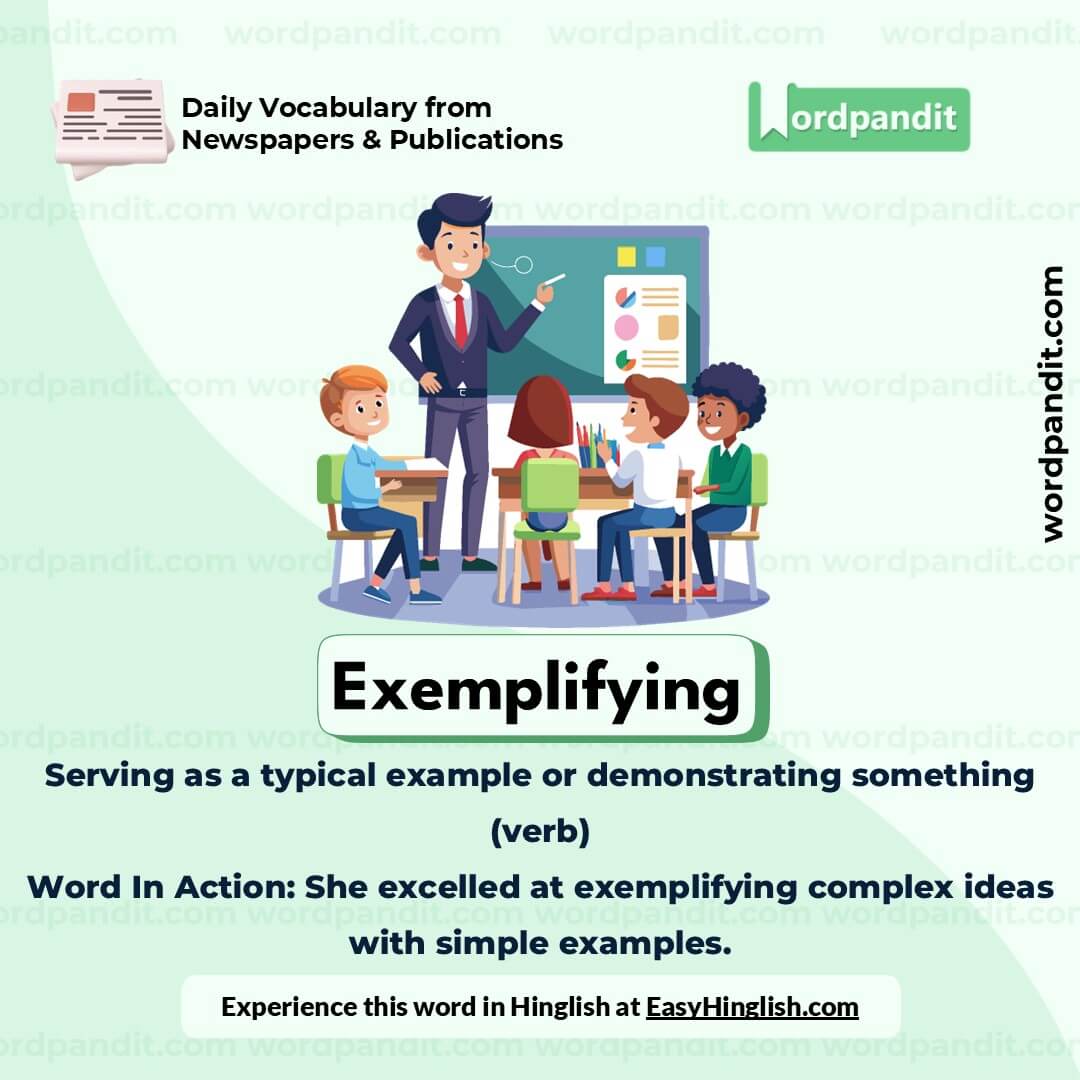Daily Vocabulary from Indian Newspapers and Publications
Welcome to Wordpandit’s Indian Vocabulary Hub
At Wordpandit, we understand the importance of staying rooted in the local context while expanding your language skills. This section focuses on enriching your vocabulary with words and phrases drawn from India’s leading newspapers and publications, ensuring you're learning vocabulary that is practical, relevant, and uniquely Indian.
Why Indian Sources Matter
We believe that the best way to master any language is by immersing yourself in local content. That’s why we carefully curate vocabulary from top Indian publications, including:
- The Hindu
- The Times of India
- The Economic Times
- Hindustan Times
- Live Mint
- The Indian Express
- And many others...
Stay Updated, Stay Relevant
With daily updates from Indian news sources, you’ll be consistently learning words that reflect the trends and shifts in Indian society and culture. Our focus is to provide vocabulary that enhances your understanding of the language in an Indian context.
How Wordpandit Supports Your Goals
Whether you’re preparing for exams, aiming to improve your professional communication, or simply want to stay connected with the latest Indian vocabulary, Wordpandit is here to guide you every step of the way.
Learn with a Practical Approach
Our interactive learning methodology includes real-world examples, engaging activities, and context-specific usage to ensure that every word becomes part of your active vocabulary.
Dive into Indian Vocabulary Today!
Why Choose Wordpandit?
Practical Learning: Focus on words you'll actually encounter in real-world reading, enhancing your comprehension and communication skills.
Diverse Content: From current affairs to scientific breakthroughs, our varied sources expose you to vocabulary across multiple domains.
Effortless Integration: Make Wordpandit a part of your daily routine. Just a few minutes each day can significantly boost your lexicon over time.
Your Path to Vocabulary Mastery
- Visit our Daily Vocabulary section regularly
- Explore new words and their usage in context
- Practice incorporating these words into your own writing and speech
- Track your progress as your vocabulary expands
Start Your Journey Today
Embark on your vocabulary enhancement journey with Wordpandit. By consistently engaging with our daily posts, you'll build a robust vocabulary that serves you well in academic, professional, and personal contexts.
Remember, a word a day keeps linguistic limitations at bay. Make Wordpandit your daily companion in the quest for vocabulary excellence!
WORD-1: Perplexity
Context:
"Because of Perplexity AI, research has become faster. In a lot of places, there were redundancies and in some places there were performance issues." - Money Control
Explanatory Paragraph:
The word "Perplexity" refers to a state of being confused or puzzled, often due to the complexity or ambiguity of a situation. In this context, it signifies the potential challenges or confusion researchers might face before tools like Perplexity AI streamlined their processes.
Meaning: A state of being confused or puzzled, or something that is difficult to understand (noun).
Pronunciation: per-PLEK-si-tee
Difficulty Level: ⭐⭐⭐ Intermediate
Etymology: Derived from the Latin word perplexitas, meaning "entangled" or "confused," which stems from perplexus ("thoroughly entwined").
Synonyms & Antonyms:
Synonyms: Confusion, puzzlement, bewilderment, uncertainty
Antonyms: Clarity, certainty, simplicity, understanding
Usage Examples:
- The teacher's explanation only added to the students' perplexity about the topic.
- The perplexity of the puzzle made it a favorite among enthusiasts.
- She looked at the map in utter perplexity, unable to find her way.
- The sudden change in his behavior left everyone in a state of perplexity.
Cultural Reference:
"Perplexity" is a common theme in literature, such as in Lewis Carroll's "Alice's Adventures in Wonderland," where Alice frequently experiences perplexity while navigating the strange and confusing world of Wonderland.
Think About It:
How can modern tools like Perplexity AI help reduce confusion in areas like research, and what are the potential limitations of relying on such tools?
Quick Activity:
Write a short paragraph describing a situation where you experienced perplexity and how you resolved it.
Memory Tip:
Think of "perplexity" as a knot—just like a tangled string, it represents confusion or complexity that needs to be unraveled.
Real-World Application:
"Perplexity" is frequently used in technical discussions, literature, and daily communication to articulate moments of confusion or complexity. Understanding its use can help in clearer communication and better problem-solving strategies.
WORD-2: Automated
Context:
"Second is the support function of client and customers which is getting automated and streamlined." - Money Control
Explanatory Paragraph:
The word "Automated" refers to the use of machines, systems, or software to perform tasks with minimal human intervention. In the given context, it highlights how customer support functions are being enhanced and made more efficient through automation technologies.
Meaning: Operated or controlled by machines or technology, often to reduce human effort (adjective).
Pronunciation: aw-toh-MAY-ted
Difficulty Level: ⭐⭐ Beginner
Etymology: Derived from the Greek word automatos, meaning "self-moving," and popularized in the early 20th century with the advent of industrial automation.
Synonyms & Antonyms:
Synonyms: Mechanized, computerized, robotic, self-operating
Antonyms: Manual, hand-operated, non-automated
Usage Examples:
- The factory introduced an automated assembly line to increase production efficiency.
- Many businesses are investing in automated systems to handle routine customer inquiries.
- The automated reminder system ensures clients never miss an appointment.
- The rise of automated vehicles is revolutionizing the transportation industry.
Cultural Reference:
Automation has been a recurring theme in science fiction, such as in Isaac Asimov's "I, Robot," which explores the ethical and societal implications of automated machines and artificial intelligence.
Think About It:
How can the widespread use of automation impact job markets and skill development in the future?
Quick Activity:
List three tasks in your daily life that could benefit from being automated and explain why.
Memory Tip:
Think of "automated" as "automatic" with added technology—it's about machines or systems doing the work for you.
Real-World Application:
"Automated" is widely used in industries like manufacturing, customer service, and IT to describe systems that save time and reduce errors. It’s a key concept in the modern digital economy.
WORD-3: Diligence
Context:
"Raghav Gupta and I have been running this company bootstrapped without ever using investor capital because we are super strict with our financial planning and diligence." - Money Control
Explanatory Paragraph:
The word "Diligence" refers to consistent and careful effort to accomplish a task or responsibility. It reflects a sense of persistence, hard work, and attention to detail. In the context provided, it emphasizes the meticulous financial planning and effort the speakers have invested in running their company.
Meaning: Careful and persistent work or effort (noun).
Pronunciation: DIL-uh-jens
Difficulty Level: ⭐⭐⭐ Intermediate
Etymology: Derived from the Latin word diligentia, meaning "carefulness" or "attentiveness," and from diligere, which means "to value highly" or "to love."
Synonyms & Antonyms:
Synonyms: Perseverance, thoroughness, attentiveness, industriousness
Antonyms: Neglect, carelessness, laziness, apathy
Usage Examples:
- The student’s diligence in studying earned her the top spot in the class.
- Maintaining financial diligence is critical for small business success.
- The investigator worked with great diligence to solve the complex case.
- Diligence and patience are key traits of a successful artist.
Cultural Reference:
The phrase "due diligence" is widely used in the business world, particularly during mergers and acquisitions, to describe the careful examination and evaluation of financial and legal risks before making a decision.
Think About It:
What areas of your life could benefit from more diligence, and how might it change the outcomes?
Quick Activity:
Identify a task or goal that requires diligence. Write down three specific steps you can take to approach it more diligently.
Memory Tip:
Connect "diligence" with "diligent ants" – ants are known for their hardworking and persistent nature, making them a perfect metaphor for diligence.
Real-World Application:
"Diligence" is an important trait in professional environments, academic settings, and personal growth. Developing diligence helps in consistently achieving high-quality results and building a strong reputation.
WORD-4: Epitome
Context:
"But the same microchip, an epitome of technological progress, is intruding into our neurons like a mischievous Trojan horse." - The New Indian Express
Explanatory Paragraph:
The word "Epitome" refers to a perfect example or representation of a particular quality or type. In this context, the microchip is described as the epitome of technological progress, symbolizing the pinnacle of advancements in technology while also suggesting its potential overreach.
Meaning: A perfect example of something; a summary or condensed account (noun).
Pronunciation: eh-PIH-toh-mee
Difficulty Level: ⭐⭐⭐ Intermediate
Etymology: Derived from the Greek word epitomē, meaning "abridgment" or "summary," from epi ("into") and temnein ("to cut").
Synonyms & Antonyms:
Synonyms: Embodiment, quintessence, paragon, archetype
Antonyms: Imperfection, anomaly, antithesis
Usage Examples:
- The athlete is the epitome of dedication and perseverance.
- Her elegant dress was the epitome of sophistication.
- The small town is often considered the epitome of peaceful living.
- This painting is the epitome of the artist’s unique style and vision.
Cultural Reference:
The term "epitome" is often associated with iconic personalities or objects, such as Martin Luther King Jr. being regarded as the epitome of leadership and civil rights advocacy.
Think About It:
What qualities or traits would you consider the epitome of a great leader, and why?
Quick Activity:
Write down an example of something you believe is the epitome of innovation and explain your choice.
Memory Tip:
Think of "epitome" as "the peak of me" – it signifies the very best or most representative aspect of something.
Real-World Application:
"Epitome" is used to highlight excellence or representativeness in fields like art, technology, leadership, and culture. Recognizing what constitutes the epitome of something helps set benchmarks for improvement and appreciation.
WORD-5: Exemplifying
Context:
"Highlighted the series’ cultural impact and its ability to connect with diverse audiences, exemplifying the universality of great storytelling." - Money Control
Explanatory Paragraph:
The word "Exemplifying" refers to the act of being a typical example or demonstration of something. In this context, the series is praised for demonstrating how great storytelling transcends cultural boundaries, connecting with audiences around the world.
Meaning: Serving as a typical example or demonstrating something (verb).
Pronunciation: ig-ZEM-pluh-fy-ing
Difficulty Level: ⭐⭐⭐ Intermediate
Etymology: Derived from the Latin word exemplum, meaning "example" or "pattern," and the suffix -fy, meaning "to make."
Synonyms & Antonyms:
Synonyms: Demonstrating, illustrating, embodying, representing
Antonyms: Obscuring, misrepresenting, concealing
Usage Examples:
- Her work exemplifies the commitment and creativity expected in this role.
- The teacher used real-life situations to exemplify the abstract concept of empathy.
- The athlete's dedication to training exemplifies the discipline required for success.
- This film exemplifies the power of visual storytelling to convey deep emotions.
Cultural Reference:
The word "exemplifying" often appears in discussions about influential works of art, such as Maya Angelou's poetry, which exemplifies resilience and the power of the human spirit.
Think About It:
What is one quality or action that you believe best exemplifies leadership, and why?
Quick Activity:
Write a sentence exemplifying how technology has changed communication in the modern world.
Memory Tip:
Remember "exemplifying" by linking it to "example" – it’s about showing or illustrating something clearly.
Real-World Application:
"Exemplifying" is frequently used in academic, professional, and creative contexts to provide clarity or highlight ideals. Mastering its usage can make explanations and arguments more compelling and precise.


















